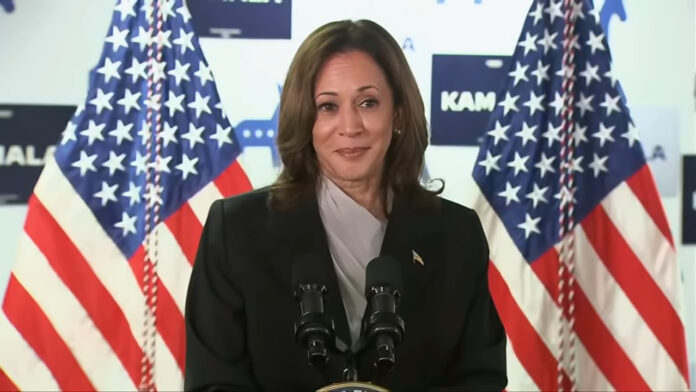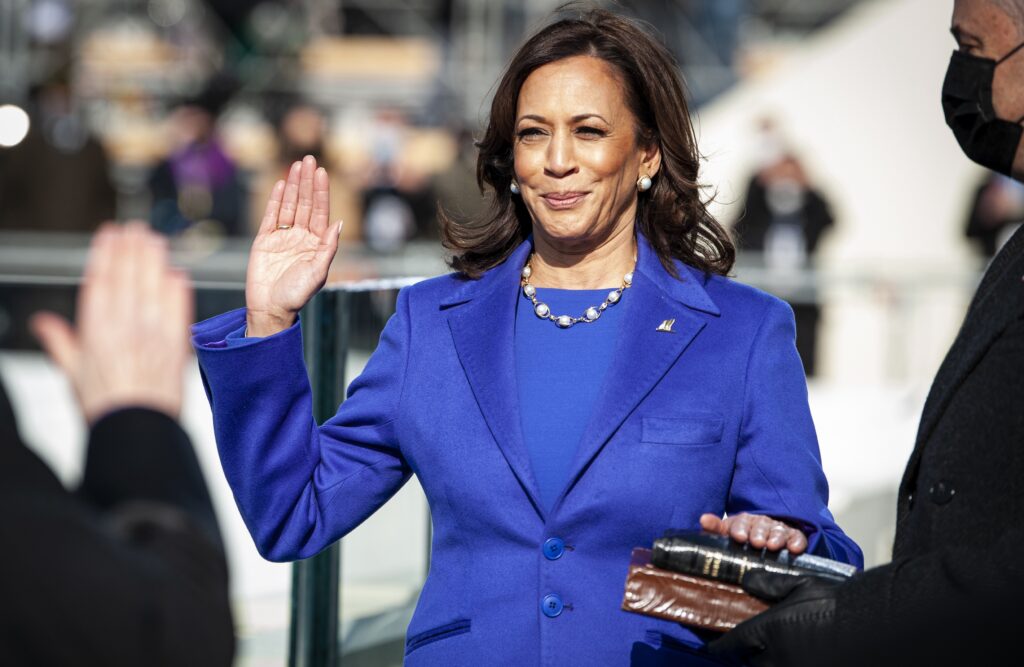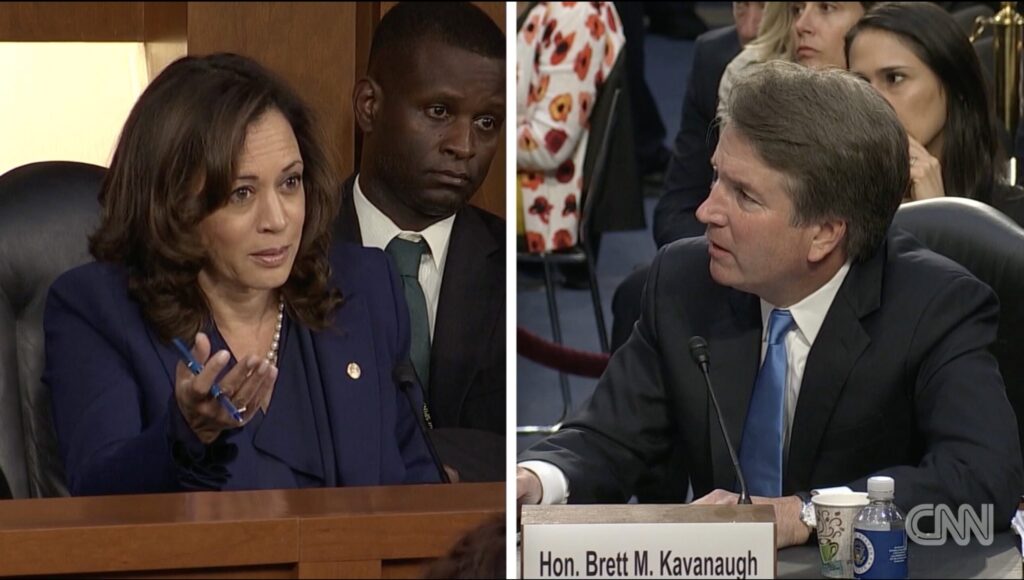
Almost from the moment the news broke Sunday, July 21 that President Joe Biden had decided to withdraw from the 2024 presidential race and endorse his vice president, Kamala Harris, the entire tone of the presidential election shifted.
It wasn’t a minor shift, it was tectonic. Former President Bill Clinton and former Secretary of State Hillary Clinton, staunch supporters of Biden, were the first national figures to endorse Harris. As the first female presidential nominee of a major political party who also beat Donald Trump in the popular vote in 2016, Hillary Clinton’s endorsement held both political weight and historical poignancy.
Delaware Sen. Chris Coons, chair of Biden’s re-election campaign, also endorsed the VP.
Harris, who did not know Biden had made the decision to withdraw and who had been fundraising for the president, issued a carefully worded statement in which she said she hoped to earn the nomination.
That nomenclature was intended to assuage anyone claiming there was a “coronation” in play, but it also opened the door for pundits like CNN’s David Axelrod, former advisor to Barack Obama, to suggest there would be more names vying for the nomination. Talking Points Memo reported that Democratic primary challenger Marianne Williamson began calling delegates to try to win their votes. But within hours, the political tide was already starting to shift away from those narratives. By Sunday evening, the majority of Democratic senators had endorsed Harris. By Monday morning, even Speaker Emerita Nancy Pelosi, who had floated a “mini-primary” idea prior to Biden dropping out, had endorsed Harris. It was Pelosi, whose questions about Biden’s mental fitness had sounded the alarm about the president’s cognition and acuity after his devastating debate performance, who had begun what would soon become a tsunami of questions and calls for Biden to drop out.
The Trajectory
When Biden developed COVID, that seemed to be the final determining factor in the burgeoning effort to oust Biden: a president weakened by a third bout of COVID walking slowly and carefully up the stairs to Air Force One was an image made for campaign ads for the opposition. It seemed only a matter of time before the president finally heard the message from Beltway insiders, celebrity donors and the Democratic leadership that he must drop out to save the election from being overtaken by Donald Trump, JD Vance, and Project 2025.
Once Biden withdrew, voters were free to exhale, thank him for his service and decide whether they wanted to see a reprise of the 1968 Chicago DNC, where a brokered convention in August resulted in three candidates vying for the nomination and the least popular being chosen by the voters, which led to a landslide victory by the GOP and Richard Nixon’s election. The alternative: have the accomplished and fully vetted vice president, who had worked alongside Biden more closely than anyone, take seamless helm of being both interlocutor of the administration’s work and the Democrats’ incipient nominee.

GOP cries foul
If Sunday was the bombshell, Monday was the reaction. While excitement on social media was massive and palpable, particularly from voters of color and Gen Z voters, the opposition was enraged. Donald Trump was so angry, he had begun tweeting from his Truth Social account late Sunday night and began again at 6 a.m. Monday.
While still posting vitriolic statements about Biden, despite his post-assasination attempt unity pledge, Trump also insisted that the switch from Biden to Harris meant he and his campaign would have to “start all over again” to frame their campaign.
It was yet another grievance move by Trump followed in close succession with statements by Vance and other members of the GOP elite.
House Speaker Mike Johnson intimated that the entire action by Biden and the Democrats could somehow be unconstitutional.
What Trump did not say, but Democrats were quick to point out, is that with Biden’s exit, the full weight of Trump’s own age, cognitive deficits and questionable acuity would now be a focal point as Trump is now the oldest candidate to ever run for president and his opponent is 20 years his junior.
A barn burner speech in Delaware
While Trump, Vance and the GOP were hand-wringing over what to do next to address the Harris ascendancy and all it entailed, the vice president gave a barn burner speech in Delaware at Biden’s campaign headquarters.
If Trump and his cohort were hoping Harris would undercut Biden and try to distance herself from his record and the administration, Harris made clear she had no intention of doing so.
She lauded Biden, his fealty to the country and to her, and she clearly enunciated their mutual plans to finish this first term together as well as her intent to win both the nomination and the battle against Trump.
Harris spoke of her emotional history with Biden’s late son Beau when the two worked together as state attorneys general.
The power of the speech was reflected in the response. The crowd was wild for Harris and you could tell the enthusiasm was infectious.
Harris made presidential campaign history, raising $81 million in donations in just 24 hours—a symbolic number as Biden won the 2020 election with 81 million votes. But also those donations—the single largest campaign haul in US history—reflected the immense relief felt by small and large donors alike regarding the future of the Democratic presidential campaign. So while the Trump team formulated their new strategy, Harris herself was forging ahead with her stated assertion that she was in it to win it.
Winning the nomination
Initial talk of that mini-primary that no other candidate was going to commit career suicide by entering and challenging the sitting vice president, who is also the first female and first Black vice president, dematerialized within mere hours. By Tuesday, July 23, Harris was able to announce in a speech at a campaign stop in Wisconsin that she had secured enough delegate votes to be the party nominee, thus avoiding the specter of that reprise of 1968 and a brokered convention ending in a Republican win.
Media Representation of Kamala Harris
Throughout the Biden-Harris administration, mainstream legacy media has been slow to report on the actions of the vice president, who often received better press coverage on her foreign trips than at home.
The refrain of “What is she DOING?” often echoed throughout social media, with only Black media doing regular coverage of Harris’s work on a panoply of social and other issues for the administration
This failure to address the vice president’s work has resulted in a gap for many voters unfamiliar with Harris’s long history of addressing issues for women, including wage issues, reproductive rights and Black maternal health; LGBTQ+ people, including civil rights, violence against trans women of color and gender-affirming care for trans youth; poverty and social welfare; gun control; and climate change.
As a senator, these issues were paramount for Harris and were a big part of her 2019 presidential campaign, which she suspended due to lack of funding in December 2019, just before the start of the 2020 presidential primaries.
Since the Dobbs decision ending Roe v. Wade, Harris has become the nation’s most prominent spokesperson for women’s reproductive freedom and her speeches while campaigning for Biden’s re-election formed a dramatic counterpoint to the GOP’s anti-abortion stance.
Kamala Harris, prosecutor
Harris’s history as VP, senator, Attorney General of 40 million Californians in the most populous state and district attorney of San Francisco is already becoming the stuff of scrutiny and attack ads.
Harris’s long history as a prosecutor had been part of her campaigning against Trump even before Biden withdrew from the race. She invoked the cases Trump has already been found liable for or been convicted of, noting that as a prosecutor, she prosecuted sexual assault and fraud and white collar crimes.
But when Harris was running for president in 2019, her decades as a prosecutor became a source of contention for progressives. The “Kamala is a cop” meme initially developed by the right at The Federalist, which started selling T-shirts with her face and that tagline when Harris was initially leading in the race, became a rallying cry among Bernie Sanders’ and Elizabeth Warren supporters. Whether that will be revived for these final months of the election is unclear as it’s expected progressives—particularly Gen Z—are energized by Harris’s newly minted candidacy.
Harris V. Trump
As a senator, Kamala Harris took on then-President Trump repeatedly in her role on various committees. She famously made Trump’s first Attorney General “nervous,” or so he said as she grilled him.
When Harris questioned Trump’s second Attorney General Bill Barr, he was equally discomfited. Her no-nonsense, rapid-fire “please answer yes or no” questioning unsettled both men.
So too did Harris’s questioning of then-Supreme Court nominee Brett Kavanaugh, of whom she demanded to know if there was a law governing male body parts only—referencing Roe v. Wade. She then asked if Kavanaugh considered Obergefell v. Hodges, which legalized same-sex marriage, to be “established landmark precedent,” like Brown v. Topeka. When Kavanaugh declined to answer, Harris said, “I’ll take that as a no.”
Those embarrassments by Harris of top Trump minions enraged the right, which has yearned for payback. But whether they will have that opportunity in the next few months remains to be seen.

Harris V. GOP
Harris is already ahead of Trump in initial polling post-announcement of Biden’s withdrawal. That polling bump could widen. The GOP is already aiding Trump-Vance by targeting Harris on several levels. Throughout her vice presidency, the GOP has taken the racist and misogynist stance that Harris is a “DEI hire” without qualifications to be vice president, let alone president.
That Harris has a long resume of accomplishments in which she has almost always been the first woman and/or person of color in her respective positions has only served to bolster that assertion rather than mitigate it.
In addition, the new narrative about Harris is as an underhanded schemer hiding the failing physical and mental health of the president from the American people to gird her own power.
That narrative has already made it into political ads, including one from Make America Great Again PAC in which a laughing Harris and a slow-moving Biden are featured with an alarming voiceover querying what she knew and when she knew it and suggesting that she is the shadow president.
That same messaging is also reflected in calls from Republican elects as well as Vance for a next step from Biden: Speaker Johnson has said if Biden is too frail to run a campaign for re-election, he is too frail to be president and should resign.
As the convention draws near, these GOP attacks will only broaden. Trump is wary of invoking abortion, which has proven to be a volatile issue for the GOP. But they won’t shy away from attacking Harris’s decades of support for reproductive rights or the civil liberties of LGBTQ+ people, arguing that Harris represents extremist views and is only responsive to parts of the electorate.
The stakes have never been higher and the importance of winning this election more critical. A lot is riding on Kamala Harris. But the Democratic mood is upbeat and Harris, herself — with apparent boundless energy — has hit the ground running in her Chuck Taylor’s ready to dispatch Trump as she did his Attorney General and Supreme Court nominee.